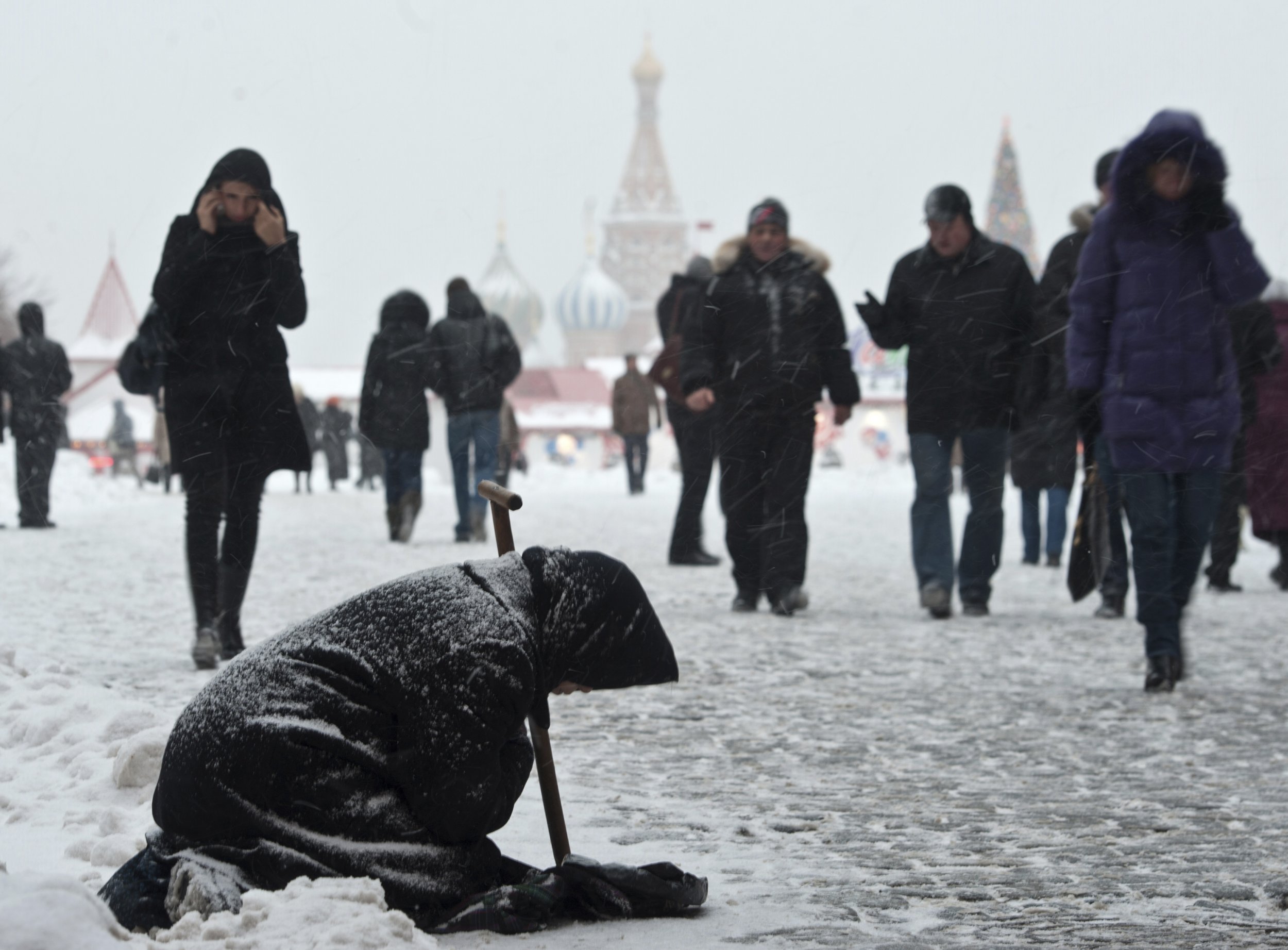
This article first appeared on the Kennan Institute site.
Russian society has been very slow to pick up on the approaching signs of crisis in the country.
Russians' perceived well-being decoupled from their economic expectations about two years ago, after the annexation of Crimea in March 2014. A newly found great-power euphoria, and the perception that crises go away quickly, helped people to dismiss the possibility that the country was sliding into a protracted recession.
Now the realization is sinking in that Russia is in it for the long haul. The society's response is to hunker down rather than to assign blame to the Kremlin. This is predictable. But the longer the crisis lasts, the less predictable its social and political effects will be.
Real wages, real pensions and, as a result, incomes in general were growing for a very long time. Real income growth averaged 8 percent a year, increasing by 112 percent between 2000 and November 2014. This had a huge social impact: It created an entirely new standard of living in Russia's cities and brightened the way people felt about their prospects.
That growth is gone. Russian officials project that the economy will contract 1 percent to 1.5 percent this year, after having shrunk 3.7 percent in 2015. Household income is also in steep decline. In February, ordinary Russians' incomes went down for the 16th month in a row, according to official statistics. This will continue all year, which means that by the end of 2016 the Russian population will have experienced more than two years of continuous income decline, a major reversal of fortune for a country that went through almost a decade and a half of consumption growth.
Poverty is creeping back into Russia. The share of those considered officially poor, except for a short blip in 2008, was declining steadily throughout the above-mentioned period. This has now been reversed. In 2015, more than 3 million Russians slid into official poverty. Almost 20 million people, or 13.4 percent of the Russian population, are now living below the poverty line.
More than 70 percent of those newly poor are families with children, the economist Lilia Ovcharova estimated in an interview with Vedomosti. "In families, the effects of income decline are multiplied because parents are responsible for their dependents," Ovcharova pointed out. "One-parent families are the hardest hit."
The three previous economic downturns that are on everyone's minds were short-lived. Currency devaluation (in 1998), generous state bailouts (in 2008) and a commodity prices rebound (in 2012) allowed the economy to bounce back quickly. None of these fixes are available now, except, of course, for one possibility (but not a certainty): a sudden resumption in the growth of oil prices, to save the day.
The Crimea euphoria is starting to dissipate, and the gap between perception and reality is beginning to close, albeit in a peculiar way. People are lowering their expectations rather than trying to overcome hurdles.
"Spend as little as possible, do not borrow, do not trust your cash to banks—these are the new rules of household behavior, the kind of behavior we have not seen in a long time," Oleg Chernozub, an expert with the pro-Kremlin pollster VTsIOM, told Vedomosti:
"When economic agents start hoarding cash, they create deflationary pressures. Firms start to produce less because they can no longer sell. Workers start to fear they'll lose their jobs and stop spending; this is a well-known vicious circle.… The share of economic pessimists started to squeeze the share of optimists in the spring of 2015. A long-term emotional depression influences the behavior: people are clinging to whatever they have rather trying to earn more."
The way the Russian society is choosing to respond to this downturn is likely to make things worse, because every second ruble spent in the Russian economy is a household ruble. "People have started to save, and this is yet another challenge to the prospects of growth. Consumption has ceased to be a driver of growth," Ovcharova says.
"This is a very serious problem," Natalia Zubarevich, an economic geographer and an astute commentator on the Russian economy, wrote in a recent op-ed. "People in the big cities feel frustrated and depressed, but they are adapting to their new lives. The crisis will not cause an increase in unemployment in major cities, but it is reducing status and stifling ambitions."
Consumer confidence is falling while political confidence stays relatively high. Russia is sobering up to the economic reality but not to the political one. This means that the majority of the Russian population does not connect the state of the country's economy to the Kremlin's political decisions.
This disconnect is not happening all by itself: The Kremlin has been working hard on preventing people from seeing politics as a solution. All attempts to engage in independent political action are presented domestically as foreign-sponsored subversive activity. An unintended consequence of this strategy is that people learn to feel helpless in the face of the worsening economic situation.
Economic conditions are seen in Russia as much like weather conditions. As an old song goes, "The snow is snowing, the wind is blowing, but I can weather the storm." From the incumbent's standpoint, this may sound like a good solution. But it is only good for a while. It means that people will get back into politics only when the situation reaches a boiling point, and hasty action taken out of extreme necessity never produces healthy political change.
Maxim Trudolyubov is a senior fellow at the Kennan Institute. The opinions expressed here are solely his.
Uncommon Knowledge
Newsweek is committed to challenging conventional wisdom and finding connections in the search for common ground.
Newsweek is committed to challenging conventional wisdom and finding connections in the search for common ground.
About the writer
To read how Newsweek uses AI as a newsroom tool, Click here.








